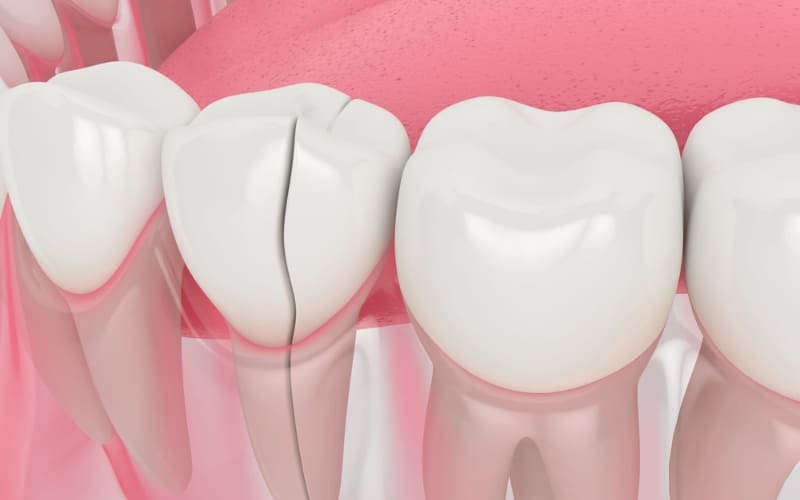A cracked tooth poses both discomfort and potential dangers to oral health. Initially, it may cause sensitivity to hot or cold foods and beverages and pain when chewing or biting. However, if left untreated, it can lead to more severe issues such as infection or tooth loss. Seeking professional dental care is typically the most effective approach to treatment. Nevertheless, there are ways by which you can fix a cracked tooth naturally. But before this, it is essential to understand the answer to a question.
Can a Cracked Tooth Heal Itself?
No, cracked teeth cannot heal themselves naturally. Unlike other body parts, such as bones or skin, teeth cannot regenerate or repair themselves. This is primarily because teeth comprise non-living tissues like enamel, dentin, and cementum. Once a tooth is cracked, the damage is permanent and cannot be reversed by the body’s natural healing processes. But with the help of a few methods and relief options, you can fix a cracked tooth naturally.
Natural Pain Relief Options
1. Warm Saltwater Rinse: Gargling with warm salt water can relieve inflammation and kill bacteria. To make it, dissolve half a teaspoon of salt in a cup of warm water. Swish the solution in your mouth for approximately 30 seconds before spitting it out. Repeat a few times daily, especially after meals or before bedtime.
2. Clove Oil: Clove oil contains eugenol, a natural anesthetic with numbing properties. It can be an excellent option to fix a cracked tooth naturally. Apply a small amount of clove oil directly to the affected area using a cotton swab or your fingertip. Be cautious not to swallow it, and avoid using excessive amounts, as they can irritate.
3. Cold Compress: A cold compress can alleviate swelling and numb the area, reducing pain. Wrap a couple of ice cubes on a towel and place them on the outside of your cheek, near the impacted tooth, for 15-20 minutes. Repeat every few hours as needed.
4. Over-the-counter Pain Medication: Options like ibuprofen or acetaminophen can help manage pain and inflammation. Follow the dosage instructions on the packaging carefully to avoid overdosing and potential side effects. It’s essential to consult a healthcare professional if you have any concerns or underlying health conditions.
5. Soft Food Diet: Soft foods minimize pressure on the cracked tooth, reducing discomfort. Choose foods like mashed potatoes, yogurt, soup, or smoothies that are easy to chew and won’t exacerbate the pain. Avoid hard or crunchy foods that can further aggravate the condition.
Tips for Preventing Further Damage
1. Avoiding Hard Foods: Steering clear of hard or crunchy foods can prevent further damage to the cracked tooth. Examples include hard candies, nuts, popcorn, ice cubes, and raw vegetables like carrots or apples.
2. Using Dental Wax: Dental wax is a temporary cushion or barrier to protect the cracked tooth from irritation caused by sharp edges or rough surfaces. Wash your hands thoroughly, dry the affected tooth, and mold a small piece of dental wax over the crack, ensuring it adheres securely. Replace the wax as necessary, particularly after eating or brushing your teeth.
3. Gentle Brushing and Flossing: Adopting a gentle approach to oral hygiene helps prevent exacerbating the crack or causing additional damage. Use a soft-bristled toothbrush to clean your teeth and gums, avoiding vigorous scrubbing or using excessive force. Floss carefully around the cracked tooth, ensuring not to apply too much pressure or pull too hard, which could worsen the crack or dislodge any loose fragments.
Wrap Up!
In conclusion, while natural remedies can offer temporary relief and help you fix a cracked tooth naturally, seeking professional dental care is crucial for treating a cracked tooth effectively. A dentist may recommend various treatment options based on the severity of the crack, including dental fillings/sealants to restore minor damage, crowns to strengthen and protect the tooth, or root canal therapy for more extensive cracks that involve the tooth’s pulp. In some cases, extraction may be necessary if the tooth is severely damaged and cannot be saved. It’s essential to consult a dentist to determine the most appropriate treatment plan for addressing a cracked tooth and preventing further complications.


